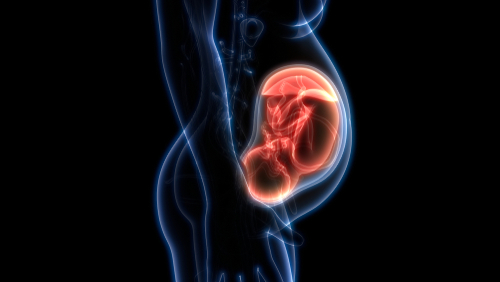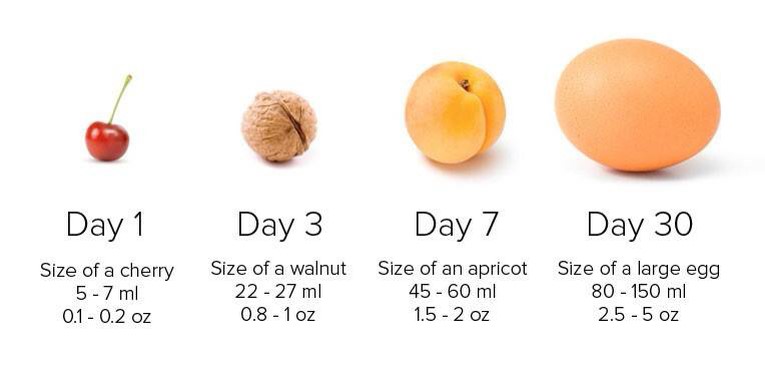Last Updated on October 22, 2024 by Mandy Gurney
Understanding young baby’s sleep
From birth to 4 months old

Infants have sleep patterns and schedules that differ significantly from ours, making their sleep often unpredictable. As they mature, their sleep alters in terms of how it’s structured over the day and night. Understanding these shifts in your newborn’s sleep can help you anticipate their sleep patterns and gradually guide them toward healthy sleep habits.

Our internal 24-hour body clock, or circadian rhythm, regulates our sleep, wake, and eating times using daylight to reset itself and darkness to signal sleep time; however, in the womb’s dark environment, babies lack this light cue and spend most of the pregnancy asleep. It is not until your last trimester that your baby will have some brief periods of two or three hours per day, awake.

Before birth, your movement and the melatonin your baby receives through the placenta help to regulate their sleep. This means your newborn will need to establish their body clock and begin producing their own hormones. Newborns tend to be very sleepy in their first few days, especially if born before their due date, however, if your baby is born post-term they may skip this super-sleepy stage entirely.

- Initially, your newborn baby will have about 3 days’ supply of melatonin that comes via your placenta. This is nature’s very clever way of helping you recover from the delivery and giving time for your breast milk to come in. After these first 3 days, the next time your baby’s own melatonin is produced to a level that impacts their sleep is when they reach 3 to 4 months old.
- Your newborn baby will spend an average of 16-17 hours a day asleep – with their sleep being split roughly 50:50 between the day and night.
- Life would be very simple if this came in one big chunk, but of course, it is split into many periods of two to three hours scattered throughout your own sleeping and waking times.
- This unpredictable pattern happens because your baby’s biological clock, or circadian rhythm, is slow to develop and as yet your baby is unable to distinguish night from day; until then their nights and days will simply blend together.
- At this stage, your baby’s sleep is governed by their need to feed and since their tummy is so small, sleep episodes will be brief.

- Your very young baby may only be awake for 45 to 60 minutes at a time before needing to sleep again. To help prevent your baby from becoming over-tired and harder to settle it is best to use a combination of timings, based on when your baby wakes, and their sleepy cues.
- Often the very first sign your baby needs sleep is when they become quiet and still after a period of wakefulness. This is the time to reduce stimulation and start settling your baby to sleep.
- Some babies are very subtle in their cues meaning it can be easy to miss their first signs of tiredness, your baby may then move on to yawning, to crying and become fractious and hard to settle. Your baby will find it much easier to fall asleep if you are able to respond to those early sleep cues.
- In the first few months, your baby’s sleep cycles in the day will be about 30 minutes long and at night they are about 60 minutes long.
What kind of sleep does your young baby have?
- Your young babies’ sleep looks very different in their first 3 to 4 months; they do not experience the different stages of sleep as adults do, instead, they experience active sleep (our rapid-eye movement, REM, sleep), and quiet sleep (our non-rapid-eye movement, NREM, sleep).
- Because of its developmental importance, young babies spend a lot of time in REM sleep; in fact before birth, your baby spends almost all of their time in this sleep-like state.
- REM sleep is thought to be vital for promoting brain maturation and the growth of neural pathways within your baby’s developing brain and accounts for 50 per cent of your newborn’s sleep state. As your baby grows their sleep cycles alter and they spend less time in REM sleep.
- During REM sleep you will often see your baby move, twitch, jerk, their eyes move about under closed eyelids, their breathing speed up, and their mouth move. At times you may even think your baby is awake, but if you wait a few moments and just observe them, your baby may be transitioning between sleep cycles and just settle naturally back into quiet sleep; rather than fully waking.
How to help your young baby sleep well?
- In these early few weeks, you can help your young baby start the process of concentrating their sleep into the night by going outside every day for some fresh air and a lovely dose of daylight.
- A study in 2004 found young babies tended to sleep longer at night if they had been exposed to lots of early afternoon light. Combining the effects of daytime light with the soporific effects of darkness in the evening will help your baby on the journey to learning that nighttime is for sleeping.
- When you put your baby in their Moses basket for their daytime nap, leave the curtains open and do not try to minimize noise. Play and interact with your baby when they’re awake in the day and make feeds a social occasion, perhaps gently talking or singing to your baby. Studies have shown that newborns who were active at the same time of day as their parents were quicker to develop their own body clock.
- In contrast, keep the bedroom dark at night and during night feeds, keep your voice low and eye contact minimal to avoid over-stimulating them; only change nappies if it is really necessary.
- To help optimise your sleep, its best to base your very young baby’s bedtime close to yours. Putting your very young baby to bed too early may mean a very early morning start for you.
- You will soon see even by 4 weeks that your baby is sleeping a little longer during the night and a little less in the day and will typically sleep for a total of six to seven hours during the day and eight to nine at night.
Your baby’s sleep at 2 to 3 months:
- By the age of eight to ten weeks, most babies can now distinguish night from day, a stage of development that parents greet with great relief. The amount of sleep your baby will need doesn’t alter much but it’s how they take it that changes.
Your baby’s sleep from 3 months:
- By three months your baby will sleep much more at night than in the day, on average 9-11 hours at night and around 5 to 6 hours in the day and their night-time sleep is now in longer chunks; in fact studies show that about 50% of 3-month-old babies can now sleep for five or six hours at a time at night.
- Your baby will now be producing their own melatonin that will help their sleep, and day-and-night rhythms are in place. The hormone melatonin is now influencing your baby’s maturing sleep patterns and they will now enter into deep sleep at the start of the night, a pattern they will follow for life
- Your baby’s naps will probably start about two hours after first waking in the morning.
- As your baby becomes skilled at recognizing cues from you and is able to understand what is happening this is the perfect time to introduce a bedtime routine, if you haven’t done so already.
- Night-time sleep cycles slowly start to extend to 90 minutes and daytime sleep cycles start to increase to 45 minutes. This means your baby will rouse less often during sleep and sleep for longer periods.
- By now your baby will probably be sleeping about twice as long at night as they are during the day.
0 Comments







